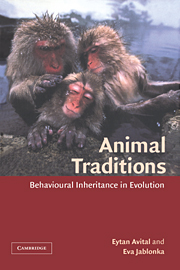Book contents
- Frontmatter
- Contents
- Preface
- Acknowledgements
- 1 New rules for old games
- 2 What is pulling the strings of behaviour?
- 3 Learning and the behavioural inheritance system
- 4 Parental care – the highroad to family traditions
- 5 Achieving harmony between mates — the learning route
- 6 Parents and offspring – too much conflict?
- 7 Alloparental care – an additional channel of information transfer
- 8 The origins and persistence of group legacies
- 9 Darwin meets Lamarck – the co-evolution of genes and learning
- 10 The free phenotype
- References
- Index of species
- Index of subjects
6 - Parents and offspring – too much conflict?
Published online by Cambridge University Press: 28 October 2009
- Frontmatter
- Contents
- Preface
- Acknowledgements
- 1 New rules for old games
- 2 What is pulling the strings of behaviour?
- 3 Learning and the behavioural inheritance system
- 4 Parental care – the highroad to family traditions
- 5 Achieving harmony between mates — the learning route
- 6 Parents and offspring – too much conflict?
- 7 Alloparental care – an additional channel of information transfer
- 8 The origins and persistence of group legacies
- 9 Darwin meets Lamarck – the co-evolution of genes and learning
- 10 The free phenotype
- References
- Index of species
- Index of subjects
Summary
As with the relationships between mates, the focus of most evolutionary studies of the relationships between parents and their offspring and between siblings is conflict. This is not really surprising. Human beings have always been fascinated with family conflicts, as our myths, literature and gossip show. The Old Testament is a rich testimony to the centrality of conflicts in our lives: think about the bloody dispute between Cain and Abel, which culminated in the murder of Abel and the stigmatisation of the human race; think about Rebecca's maternal manipulation of the rivalry between Jacob and Esau over status; think about the story of Joseph and his brothers. But family conflicts are not limited to humans. Animal life is also full of sibling rivalry and parental attempts to control their unruly children. The interests of siblings often clash, and frequently those of parents and offspring seem not to coincide. As we know all too well, the joys of family life are marred by many problems.
Although learning is an essential part of the ambivalent and intricate interactions between parents and their offspring, evolutionary interpretations of these interactions have failed to take into account the limitations and possibilities that learning introduces into the relationship. In this chapter, we will try to show how incorporating learning into the evolutionary scheme provides additional and alternative explanations of many aspects of parent–offspring relationships.
- Type
- Chapter
- Information
- Animal TraditionsBehavioural Inheritance in Evolution, pp. 171 - 207Publisher: Cambridge University PressPrint publication year: 2000

